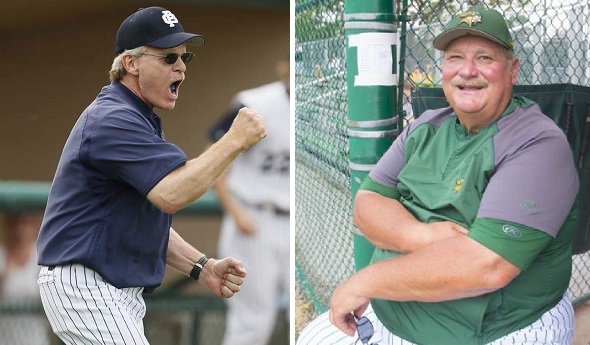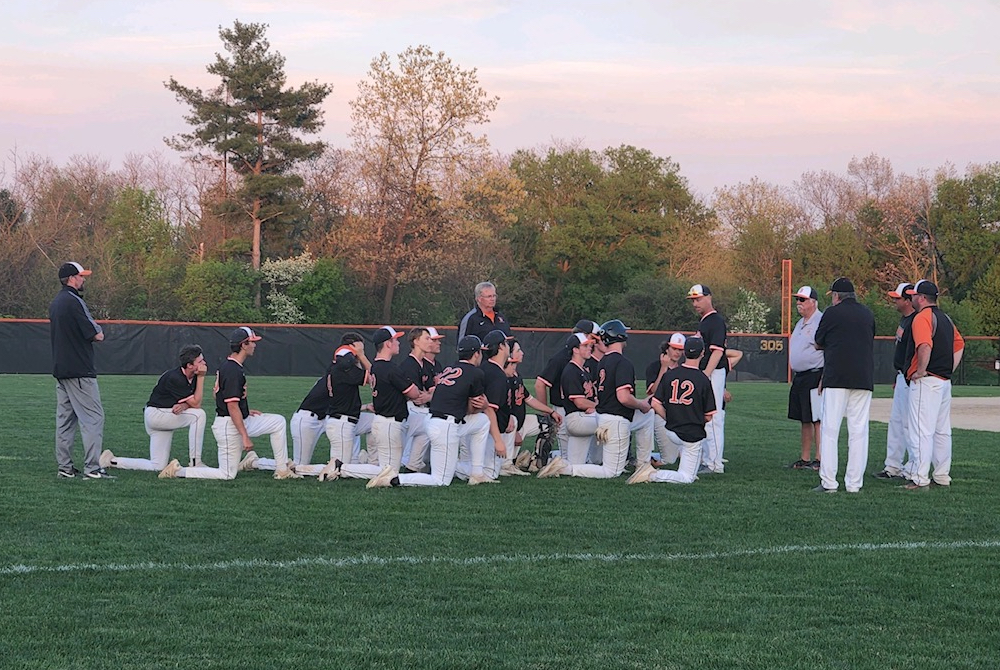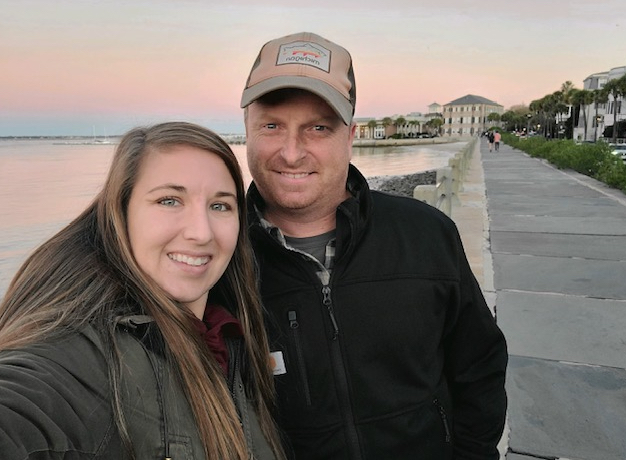
Pointes' Pride Instilled by Longtime Leaders
By
Tom Markowski
Special for Second Half
May 31, 2017
GROSSE POINTE – Neither Frank Sumbera nor Dan Griesbaum were raised in Grosse Pointe.
 But no one, at least at the high school level, has done more to enhance and promote baseball in the Pointes than this long-serving pair.
But no one, at least at the high school level, has done more to enhance and promote baseball in the Pointes than this long-serving pair.
Sumbera, 69, is in his 45th season as coach at Grosse Pointe North and Griesbaum, 64, is in his 34th season at Grosse Pointe South. In this sport the rivalry that exists between Grosse Pointe’s two public high schools is as good as it gets. Sumbera holds the upper hand in MHSAA Finals titles, 2-1, and Griesbaum has the edge in District titles, 23-14.
This last statistic is notable in a sense that the two programs are often paired in the same District, as they are this season. South will host North in a Division 1 District Semifinal at 10 a.m. Saturday.
This season there is an added twist to the much-anticipated community showdown. Grosse Pointe Woods University Liggett, for the first time, will compete in the Division 1 tournament lined up on the other side of the bracket from North and South. University Liggett will play Detroit East English in the other Semifinal at 11:30 a.m. The winners will play for the title approximately 2 p.m.
University Liggett won four MHSAA Finals titles the past six seasons, two in Division 4 and two in Division 3, including last season in the latter. Coach Dan Cimini, knowing he had a strong team returning, petitioned the MHSAA to opt up to Division 1 for this season and 2018.
So far the Knights have proven they can hang at the Division 1 level. They are ranked No. 2 in the latest poll released by the Michigan High School Baseball Coaches Association.
And Cimini’s group received a break in the draw as it won’t have to defeat both North and South to win the District title.
This is Cimini’s 14th season as head coach, and he tips his hat to the job Sumbera and Griesbaum have done in laying the groundwork.
“Frank has been there forever,” Cimini said. “Dan has been there a long time. I feel old, and I’m 48. I’ve coached 22 years. No doubt about it, those guys have set the standard.”
Cimini grew up in Grosse Pointe and competed in the city’s strong Little League program. He played for Griesbaum at South and played four years in college, two at Macomb College and two at University of Detroit Mercy. He was part of the 1987 South team that reached the MHSAA Semifinals for the first time in school history.
Cimini said the quality of baseball has remained strong in the community over the years but noted there have been some changes.
“The Little Leagues are phenomenal,” he said. “The Federation ball is phenomenal. But there aren’t as many kids playing. Now there are seven teams playing in the (Little League) majors. Back when I played there were 13 of 14. I miss those days. If I could take myself back, that’s where I’d go.”
At least in the modern era, one must point to Sumbera as the person most responsible for the quality of baseball being played at the high school level.
Sumbera played three sports at Chesaning High – baseball, basketball and football – and then went on to Central Michigan where he played basketball.
 Upon graduation Sumbera went looking for a job and received a tip from a college roommate. Sumbera was told that Grosse Pointe High would be splitting into two schools, North and South, and that they needed teachers, and, naturally, coaches. North opened for the 1968-69 school year, and Sumbera was hired as an assistant junior varsity football coach. In 1973 he became the assistant varsity baseball coach, and the next season he took over the baseball program.
Upon graduation Sumbera went looking for a job and received a tip from a college roommate. Sumbera was told that Grosse Pointe High would be splitting into two schools, North and South, and that they needed teachers, and, naturally, coaches. North opened for the 1968-69 school year, and Sumbera was hired as an assistant junior varsity football coach. In 1973 he became the assistant varsity baseball coach, and the next season he took over the baseball program.
“We won the District that year,” he said. “I’ll never forget it. We beat (then Detroit, now Warren) DeLaSalle, 2-1, in the final.”
Sumbera has coached some of the best teams in the state. His 2006 Division 1 championship team was 38-1. His 1980 Class A championship team was probably his best. Five players on that team were selected in the Major League Baseball amateur draft including Bill Babcock, one of the top pitchers on that team. Babcock’s son, Luke, will enter the ninth grade next fall is expected to enroll at North and play for Sumbera.
That’s the way it is in the Pointes. This large community that borders Detroit’s eastside is infectious. It’s common for someone who grew up here to remain in the area and raise his or her own family.
“A lot of the kids I coached in the 80s, I’m coaching their sons,” Sumbera said. “They play a lot of baseball here. As they grow through the ranks to high school, (Griesbaum) and I have to make cuts. You might have 250 at the Little League level, and by the time I get them we have like eight.
“The North-South rivalry is as good as any around. I coach football, and it’s intense every year. In baseball it’s as good a rivalry as there is in the state. It’ll be the fifth time we will have played South (this season). In our last doubleheader we won the first, 12-6, and lost the second, 3-2, in eight innings. That was a crusher. It’s big. The kids know it. The families know it. They all go to church together and play against each other during the summer.”
Griesbaum, a graduate of St. Clair Shores South Lake and Central Michigan, where he played baseball, said the level of competition is remarkable especially when one considers the schools do not have open enrollment. The only way one can play for North or South is to live in the school district.
Griesbaum got his start as an assistant under Sumbera (1980-83) before going to South in 1984.
“There’s nothing like a North-South game,” he said. “Our rivalry is one of the best. It’s a baseball community. My 6-year-old grandson plays T-ball. You look at what North and South have accomplished. There’s the (Grosse Pointe) Farms and City (Little League) teams. Then there’s the success of the Redbirds that (former Detroit Tiger) Dave Bergman ran. We run a (Christmas) Holiday hitting camp. We have 75 kids the first day and 75 more the next. It’s for the second through the sixth grades. We want to expose baseball at an early age.”
Some have expressed displeasure that all three Grosse Pointe schools are in the same district. Cimini scoffs at that thought. He said there are many districts throughout the state that have more than their share of quality teams.
The last two seasons North and South were in separate Districts, and they won their respective Districts both years. In 2015, they met in a Division 1 Quarterfinal, and South won. It was the Blue Devils’ seventh trip to the Semifinals, a record (tied with Saline and Grand Ledge) for a public school in Division 1/Class A.
Cimini said he’s looking forward to seeing what his team can do against the established powers.
“I can’t wait,” Sumbera said. “The whole thing is, come June 3 you have to be ready to play.”
 Tom Markowski is a columnist and directs website coverage for the State Champs! Sports Network. He previously covered primarily high school sports for the The Detroit News from 1984-2014, focusing on the Detroit area and contributing to statewide coverage of football and basketball. Contact him at [email protected] with story ideas for Oakland, Macomb and Wayne counties.
Tom Markowski is a columnist and directs website coverage for the State Champs! Sports Network. He previously covered primarily high school sports for the The Detroit News from 1984-2014, focusing on the Detroit area and contributing to statewide coverage of football and basketball. Contact him at [email protected] with story ideas for Oakland, Macomb and Wayne counties.
PHOTOS: (Top) Grosse Pointe South's Dan Griesbaum, left, and North's Frank Sumbera both have led their respective programs for more than three decades (Sumbera for more than four). (Middle) University Liggett coach Dan Cimini played for Griesbaum at South and has built a top program in the community as well. (Photos courtesy of the Griesbaum family, C&G Newspapers and the University Liggett baseball program.

Brighton Baseball, Community Rally as Coach Comes Back Strong from Health Scare
By
Tim Robinson
Special for MHSAA.com
July 13, 2022
At first, Charlie Christner thought it was a case of heartburn.
 It was Jan. 12. He had taught social studies at Scranton Middle School for five hours and now was beginning his prep hour by preparing for his other job as baseball coach at Brighton High School.
It was Jan. 12. He had taught social studies at Scranton Middle School for five hours and now was beginning his prep hour by preparing for his other job as baseball coach at Brighton High School.
“I was actually … in my last hour (of) the day, and just started having heartburn,” he said.
So he made a quick trip to a nearby store to get an over-the-counter heartburn remedy.
“I wanted something to help me before I went to (offseason) hitting,” he recalled.
But the feeling didn’t go away, and about 4 p.m. Christner told his coaches he wasn’t feeling well and was going home.
He didn’t get there.
“I made it about a mile down the road and had to pull over and just started throwing up,” he said. “(I) felt better and started back down the road and stopped, (and) just started throwing up again, and I said ‘I’ve got to get to the hospital.’”
He called his wife, Jackie, who was at home working, and she rushed to the hospital.
Once he was admitted, Christner was diagnosed with pancreatitis.
Waiting out a serious situation
The pancreas is a gland located under the stomach which secretes hormones, including insulin, to aid in digestion.
In Charlie’s case, gallstones had blocked the ducts connecting his pancreas to his small intestine. This, in turn, was leading to part of the tissue in his pancreas beginning to die.
Over the next several weeks, the Christners made several trips to the hospital while he dealt with pain and a gradual buildup of fluid due to a cyst that had formed around the inflammation in his pancreas. The cyst made him feel full all of the time and made it difficult to eat or drink.
The pain medication affected him, too.
“It messed up his thought process a little,” Jackie said. “Some days he didn't know what day it was or, you know, he doesn't remember those days.”
Although the diagnosis was fairly swift — the Christners knew from the beginning what was wrong and what needed to be done — surgery was delayed for nearly two months to let the inflammation in his pancreas go down.
But it was still a serious situation.
“It’s a most sobering experience to have a surgeon come out and tell you your son is very sick and it’s a very serious situation and has a 70 percent chance of survival,” said Dan Christner, who coaches with his son after a long career as a basketball coach at Brighton. “I’ve seen enough missed free throws to know that if you make 70 percent of your free throws, that means 30 percent aren’t going in. It gives you pause, and (you) say let’s make sure we’re a part of that 70 percent.”
 The delay was to help increase those odds.
The delay was to help increase those odds.
“They didn't want to do surgery (right away) because of all the inflammation and everything that's going on inside your body,“ Charlie said. “If you have to do it soon, then you end up being in a position where the odds of surviving are less if we have to do emergency surgery. So they delayed it.”
Charlie and Jackie made several trips to and from the hospital during the six weeks after the initial diagnosis.
When he felt up to it, Charlie was working on lesson plans along with administrative tasks while his coaches ran offseason workouts.
“He really wanted to make sure things were coordinated,” Jackie said. “And you know, that's Charlie to a T. He wants to make sure that everything runs smoothly and in that, you know, he's informed of any decisions or changes or things that are happening with the team.”
A veteran coaching staff, led by former Pinckney baseball coach Matt Evans, stepped into the breach.
“I think the big thing on our part was making sure that it was business as usual,” Evans said. “We weren’t going to let Charlie not being there through the winter be an excuse for why we performed or didn’t perform. He’s been a stable force and head of the program for a number of years now. We knew what we needed to do, and so it was about executing a plan that's pretty familiar to us.”
Christner went to a few offseason workouts, watching from a chair.
“(Jackie) would drive me up to hitting and I'd sit in there and watch the guys for as long as I could, 30 minutes or an hour, just to give me something to do," Charlie said. “Otherwise it was, you know, a lot of daytime TV and naps. I did do some stuff with baseball during that time, even if it was just to go watch hitting for an hour and talk to the coaches on how kids are doing. ... It gave me definitely something to do and something to look forward to.”
In the meantime, the Christners were flooded with cards, texts and phone calls of support, prompting Jackie to post regular updates on her Facebook page to lighten that load.
Their families were supportive, as was the community.
“Everybody was so gracious and heartwarming and opened their arms to us and said, ‘anything you need,’” Jackie said. “There's nothing that we really needed that the community could help us with too much because we were just stuck in a hospital, just kind of sitting there waiting for medicines, waiting for diagnosis, waiting for the doctor to progress the treatment, etc. And that was kind of what we needed.”
“I’m proud of the way that everybody came together and did what had to be done, and how excited people were to see him," Evans said. “That speaks to the time that Charlie’s put into this program over the last however many years as a coach, Any time you’re a coach, you look for those moments you can point to as having a positive impact on kids and the baseball community and all those things, and I would say the willingness of everyone to pitch in is a testament to how much he’s appreciated as part of the Brighton baseball community.”
On the way back
Surgery was March 3. Christner’s gallbladder was removed, along with the dead tissue on his pancreas. A pair of cysts were drained, and he went home a few days later.
Christner, always slender in physique, had lost 40 pounds – 10 of which liquid that had been building up in the cysts.
But, albeit from a chair, he was at tryouts March 15.
His voice was weak at first, but he made his presence known.
“When he was back at tryouts, those first couple times, he would cut loose and let out a yell,” Evans said. “And it was ‘OK, Charlie’s back, and he’s in it,’ and that made everyone feel good. Same old Charlie. He’s locked in. Same old competitor.”
A frustrated competitor, at one point, irritated because fungos weren’t being hit by his coaches in the manner he prefers. But he coached from third base, albeit from his normal spot a step or two from the dugout.
He progressed from liquids to solid food (his first solid food was pizza), and returned to the classroom April 12, three months to the day his medical odyssey began.
After an 8-8 start, the Bulldogs won District and Regional titles before falling in a Division 1 Quarterfinal.
The healing continues, but things are back on schedule for Christner, who turned 40 on Saturday.
He’s not outwardly emotional. He appreciates the love and support he and his family have received, but also wishes he could have accomplished more for his team during the time he was critically ill.
Jackie Christner is not as reserved.
“I just thank God every day that he is healthy,” said Jackie, who married Charlie in 2019. “And yes, our bond has strengthened. I think everything for us just knowing that we need each other and we need people in our lives as everybody does. But especially to know that we had each other and he had me. He often said, ‘I don't know what I would do if you weren't here. I don't know what I would do. If I hadn't met you, this would be 10 times harder to go through if you weren't here.’"
PHOTOS (Top) Brighton varsity baseball coach Charlie Christner, fifth from right, addresses his team. (Middle) Charlie and wife Jackie Christner enjoy a moment on the lakeshore. (Photos courtesy of Jackie Christner.)

